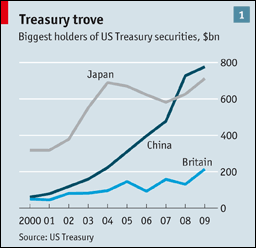November 8th 2009
Forex Implications of China-US Economic Codependency
The Economist recently published a special report on China and America (“Round and round it goes“). As the title suggests, the article described the increasing interdependency between the economies of the US and China. In a nutshell, China maintains an undervalued currency, in order to stimulate exports. The resulting overseas (American) demand puts upward pressure on the RMB, which China defuses by buying US Treasury securities. This results in artificially low US interest rates, causing American consumers to import more, putting even more pressure on the RMB, which is further defused by buying more US Treasuries. And the cycle continues ad nauseum.
The article focused primarily on the political side of this precarious relationship, at the expense of the financial implications. It got me thinking about the forex forces at work, and how a disruption in the cycle could have tremendous ramifications for currency markets. It’s clear that in its current form, this system keeps the Yuan artificially low, but does that means that the Dollar is also being kept artificially high.
Given the depreciation of the Dollar over the last six months, this seems almost hard to believe. Over the same time period, though, China (as well as many other Central Banks) have vastly increased their Treasury holdings. This would seem to imply that indeed, the Dollar’s fall has been slowed to some extent by the actions of China. It’s kind of a paradox; as US consumers recover their appetite for Chinese goods, the Dollar should decline. But as China responds by plowing all of those Dollars back into the US, then the net effect is zero.

As the Economist article intimated, there are a couple of developments that would seem to upset this equilibrium. The first would be if the Central Bank of China began diversifying its forex reserves into other currencies. By definition, however, it would be impossible for China to continue pegging the RMB to the Dollar without simultaneously buying Dollars. Thus, the day that China stops recycling its export proceeds into the US, the RMB would start to appreciate, almost instantaneously. In addition, the sudden surcease in US Treasury bond purchases would cause interest rates to rise. Both higher rates and a more expensive currency would presumably result in lower demand for Chinese exports, and hence eliminate some of the need to recycle its trade surplus back into the US. In this way, we can see that China’s Treasury purchases are actually self-fulfilling. The sooner it stops purchasing them, the sooner it will no longer need to purchase them.
I’m tempted to elaborate further on this point, but it seems that I’ve already taken it to its logical conclusion. China must recognize the dilemma that it faces, which is why it refuses to break from the status quo. If it allows the Yuan to appreciate, it will naturally face a decline in exports AND the relative value of its US Treasury holdings will decline in RMB terms. Both would be painful in the short-run. However, by refusing to concede the un-sustainability of its forex/economic policy, China is merely forestalling the inevitable. With every passing day, the adjustment will only become more painful.




November 9th, 2009 at 6:27 am
I don’t understand why low interest rates cause American consumers to import more. Can you explain this correlation?
Thanks
November 9th, 2009 at 2:41 pm
Everytime G7 meeting, the US keep repeating that China should appreciate the RMB. How is possible when the currency is not freely floated and traded ?
By adjusting or repegging at a different level would again amount to manipulation. So where do we value RMB ?
The Hong Kong Dollar is also pegged to USD. who maintains this Hong Kong Dollar ? Eventually where is the real fair value of RMB if every year China adjust the value per USD due to pressure from US and Europe ?
The Dilemma now is for China not US. China would suffer if USD weakens day by day. Once US economy is on recovery, the USD would strengthen due to high interest rates. Dollar would be bullish going forward.
November 11th, 2009 at 3:55 am
Granted some credit cards (like those from Citibank) are raping US consumers, but in general cheaper credit costs means that people are more likely to borrow and spend. But if interest rates were higher people would be more inclined to want to save AND those who wanted to overspend would have higher costs in doing so…and the costs of interest would help correct them.
US consumers were only able to take so much equity out of their home to over-spend because they had the false belief that housing prices keep increasing and thus they saw it as free money. But if they thought they would have to pay back the money then they would have been more cautious.